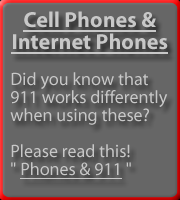

The Alum Creek VFD is more than just a group to call when there is an emergency. We have a strong desire to be involved in our community during non-emergency times as well. A few ways we are working hard to accomplish this are providing education and information for emergency planning. Installing smoke detectors in the home is the best advice, but there are many other things that need to be considered. We have included many links to websites that will provide a wealth of information ranging from local to federal agencies, and offered many suggestions and general ideas. Please check this page for updates as this information is subject to change without notice.
Home Fire Escape Plan
- Design an escape plan as a family, sharing ideas.
- Pick one common meeting place that everyone knows well.
- Always plan for 2 different routes of escape.
- Practice the plan monthly as if it was a real fire.
- NEVER go back inside once everyone is out.
- If your bedrooms are above the ground level, we recommend escape ladders for your windows.
A home fire escape plan is critical and often overlooked. No matter how simple and elementary it may seem to create and practice, it is a proven fact these plans can save lives. A fire never happens on a schedule and always catches people by surprise. If your family will practice the plan monthly it becomes routine, but if you actually need to use it you will be thankful. It also helps to practice your plan at odd hours such as 2:00 AM. We realize this almost sounds crazy however, most fire deaths occur between the hours of 12:00 midnight and 6:00 AM. Most people are asleep during these hours, which can cause confusion and panic if woken up to the sound of a smoke detector. One final note: get out and stay out!
Home Emergency Kit
Supplies You Should Always Have At Home
- Water - At least one gallon per day, per person.
- Food - Canned food and non-spoiling foods.
- Infant and Baby - Milk, food, diapers, medicines, etc..
- Pets - Food, water, toys, etc..
- Light - Flashlights with extra batteries.
- Heat - Alternative heating sources, fuel for heating
- Medication - Keep prescriptions filled at all times
- Records - Keep copies of insurance, will, legal papers with you
- Numbers - Keep an updated list of emergency contacts
- Always plan for emergencies to last 7-10 days.
We can't possibly think of everything but you get the idea. Emergencies can and do happen when we least expect it. These can include extended power outages, extreme weather conditions, evacuations and acts of God. We suggest the storage of these and like items in your home just for the unknown. Remember to refresh water every few months and keep it in plastic containers.
For more information or if you have questions, please download the "Getting Ready" document.
Fire Safety
Never keep these items where children can get them.
- Matches or lighters.
- Any type of fireworks.
- Household cleaners - can be mixed and create a fire.
- Heaters, high output lights, etc...
General fire safety tips.
- Have chimney cleaned at least twice per burning season.
- Never use damaged electric cords, extension cords.
- Unplug toasters and coffee makers when not in use.
- Clean clothes dryer vent and inspect yearly.
- Use extreme caution when operating space heaters.
- Never store flammable liquids in your home.
- Keep an ABC fire extinguisher in your kitchen.
- Change smoke detector batteries every 6 months.
These are just a few suggestions that may prevent a fire in your home. Just general common sense goes a long way, but there are some things that can not be prevented. The most important thing we can suggest is the use and care of smoke detectors. We recommend replacing detectors that are more than 10 years old. Over time the sensors become dirty and may fail or not alert you in time. Also, if you have natural gas appliances in your home, we highly recommend a carbon monoxide detector. Natural gas appliances can vent unburned fuel and vapors into your home, this is a tasteless, odorless and invisible vapor that can kill you. If you have questions about a certain item or need help, please contact us and we will help in any way possible.
What To Do If You Have A Fire In Your Home
First Things First
- Stay low and crawl on the floor if necessary.
- Get everyone out and STAY out.
- Never go back inside once everyone is out.
- Call 911 from another house or cell phone.
- Wait for the fire department to arrive, let them know who you are and that everyone is out.
- Tell the fire department of any hazards in your home.
If FIRE claims you as a victim:
- If insured, contact your agent as soon as possible.
- If not insured, let the fire department make some arrangements for you, assistance is available.
- Attempt to locate paperwork and valuables to secure.
We understand when disaster strikes a family and will do everything possible to minimize damage to your home. We also will help find and secure items at your request and attempt to answer any questions you may have.
To help you understand the dangers of fire and understand the actions we take when we arrive, please read the following document titled Facts about Fire.
For assistance on cleaning up after a fire, what items to keep and many other helpful ideas, please read the document titled After the Fire.
Vehicle Safety and Tips
Things to keep in your vehicle:
- Jumper cables.
- Blankets - during winter weather.
- Flashlight(s) with fresh batteries.
- 12 volt cell phone charger/adapter.
- Always keep updated registration and insurance info.
General maintenance tips:
- Keep all fluids filled - Oil, Antifreeze, Washer Fluid, etc...
- Keep tires properly inflated - they loose air over time.
- Keep fuel tank above 1/4 tank.
- Replace wiper blades annually or when they streak lines.
Safe driving tips:
- Obey all traffic signs and laws.
- Wear seat belts and use proper child safety seats. Remember, air bags alone can actually hurt you.
- Slow down in wet and snow/ice conditions. Remember, wet roads can double your stopping distance.
- Never drive through high water/flood covered roads.
- Use turn signals - even when changing lanes.
- DO NOT TAILGATE - keep back 2 car lengths from the vehicle in front of you.
- DO NOT talk on the cell phone while driving.
- Stay calm, don't fall victim to road-rage!
- If you are involved in an accident, don't move your vehicle unless you must do so to protect your life. Call 911 as soon as possible and be watchful of additional accidents.
There are many more tips available on line, but these few seem to be the most common to causing accidents. Please drive carefully and considerate to others. Oops, we almost forgot, please stay back 500 feet from fire department trucks on the roadway. If you can't see our mirrors, we can't see you!
Public Hearings
Local Utility
Information
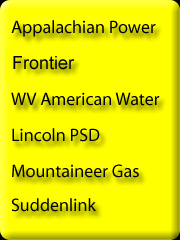
Local School
Information
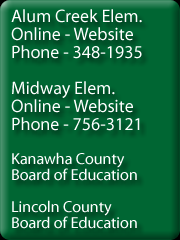
Emergency Planning
and Preparedness
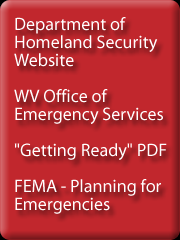
Local Numbers
and Information
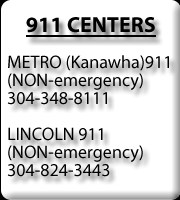
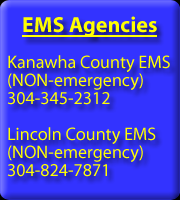
Calling 911
Information
